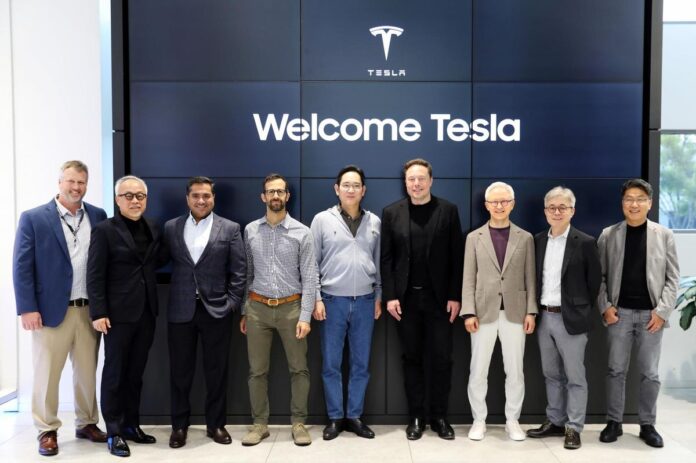Elon Musk’s Tesla has inked a $16.5 billion chip supply deal with Samsung Electronics, setting off a wave of optimism in global tech and semiconductor markets. The deal, running through 2033, marks a significant boost for Samsung’s underperforming foundry business and reflects Tesla’s ambitions to advance its AI-driven automotive capabilities.
Samsung’s shares surged nearly 7% to their highest since September 2024 after Musk confirmed the agreement. Tesla’s shares also rose 1.9% in U.S. premarket trading, underlining market confidence in this partnership.
A Lifeline for Samsung’s Texas Foundry
Samsung’s new chip factory in Taylor, Texas, is at the core of this deal. The plant will manufacture Tesla’s next-gen AI6 chip, central to its autonomous driving roadmap. Musk stated on X:
“Samsung agreed to allow Tesla to assist in maximizing manufacturing efficiency. This is a critical point, as I will walk the line personally to accelerate progress. The fab is conveniently located near my house.”
This is crucial because, until now, the Taylor fab had “virtually no customers,” according to Ryu Young-ho of NH Investment & Securities. Musk’s commitment not only assures Samsung a marquee client but also repositions its foundry business in the competitive AI chip market dominated by TSMC (which commands a 67% market share, compared to Samsung’s 8%).
The Strategic Importance of AI Chips
Samsung already makes Tesla’s AI4 chips for its Full Self-Driving (FSD) system. While TSMC will handle AI5 chip production, AI6’s shift to Samsung signals deeper collaboration between the two companies.
Production timelines remain fluid, with analysts like Lee Dong-ju from SK Securities predicting AI6 chip output by 2027–28, although Tesla’s history of missed targets tempers expectations. Regardless, this agreement strengthens Samsung’s ability to compete in the rapidly growing AI semiconductor market.
Why This Deal Matters Beyond South Korea and the U.S.
The Samsung-Tesla deal extends beyond corporate synergies—it has ripple effects for global supply chains, chip security, and India’s ambitions in semiconductors.
-
Boost to AI and EV ecosystems:
Tesla’s AI6 chips are central to self-driving technologies and energy-efficient computing. This fuels demand for advanced chip design talent, a space where India is emerging as a strong player. Many global automotive and chip majors already run design and R&D centers in Bengaluru and Hyderabad. -
Supply chain diversification:
The deal underscores the importance of reducing over-reliance on Taiwan (TSMC) amid geopolitical tensions. India’s Semicon India program aims to integrate itself into such diversified supply chains by attracting fab investments and chip assembly projects. -
Opportunity for Indian IT and engineering exports:
As Samsung scales AI chip manufacturing and Tesla ramps up EV R&D, outsourced chip design, embedded systems, and AI software engineering—India’s core strengths—are set to benefit. Indian IT majors and startups focusing on semiconductors stand to tap into this next wave.
A Trade and Policy Undercurrent
This development also aligns with ongoing U.S.-South Korea trade talks. Seoul is seeking strategic partnerships in semiconductors and shipbuilding to offset potential 25% U.S. tariffs. For India, which has been courting both Tesla and Samsung for investments, this reinforces how semiconductors are becoming the centerpiece of global industrial alliances.
The Bigger Picture: Lessons for India
India’s semiconductor push—with $10 billion in incentives for fabs and chip packaging plants—can leverage such developments. As Samsung finds success in Texas, it strengthens its case to expand chip assembly or R&D facilities in India, which is positioning itself as a “design-to-fab” ecosystem player rather than just a consumer market.
Musk has already hinted at Tesla’s India entry plans, from EV manufacturing to energy solutions. If Tesla’s AI chip and EV innovations align with India’s digital and mobility push, the spillover effects could be transformative:
-
EV localization could create demand for Indian-made electronics and chips.
-
AI-driven auto tech would accelerate India’s engineering talent relevance in global automotive supply chains.
The Tesla-Samsung deal is more than a corporate contract; it’s a signal of how AI, semiconductors, and EVs are converging into a strategic triangle shaping global industry. For India, it’s a reminder: tapping into this ecosystem—through R&D partnerships, supply-chain integration, and chip policy execution—could fast-track its tech economy in ways once unimaginable.
(Input-Reuters)








